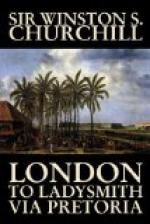‘There! there’s the white flag again. Shoot the devils!’ cried a soldier, and the musketry crashed out fiercely. ’What’s to be done, sir?’ said the Captain, turning to the Brigadier; ’the white flag has been up off and on for the last half-hour, but they don’t stop firing, and they’ve just killed two of my men.’
‘Give them one more chance.’ ‘Cease fire—cease fire there, will you?’ for the men were very angry, and so at last the musketry died away, and there was silence. Then from among the rocks three dark figures stood up holding up their hands, and at this tangible evidence of surrender we got on our horses and galloped towards them waving pocket handkerchiefs and signalling flags to show them that their surrender was accepted. Altogether there were twenty-four prisoners—all Boers of the most formidable type—a splendid haul, and I thought with delight of my poor friends the prisoners at Pretoria. This might redeem a few. Then we searched the ground, finding ten dead or dying and twenty loose horses, ten dead and eight badly wounded men. The soldiers crowded round these last, covering them up with blankets or mackintoshes, propping their heads with saddles for pillows, and giving them water and biscuits from their bottles and haversacks. Anger had turned to pity in an instant. The desire to kill was gone. The desire to comfort replaced it. A little alert officer—Hubert Gough, now a captain, soon to command a regiment—came up to me. Two minutes before his eyes were bright and joyous with the excitement of the man hunt. He had galloped a mile—mostly under fire—to bring the reinforcements to surround the Boers. ‘Bag the lot, you know.’ Now he was very sad. ’There’s a poor boy dying up there—only a boy, and so cold—who’s got a blanket?’




